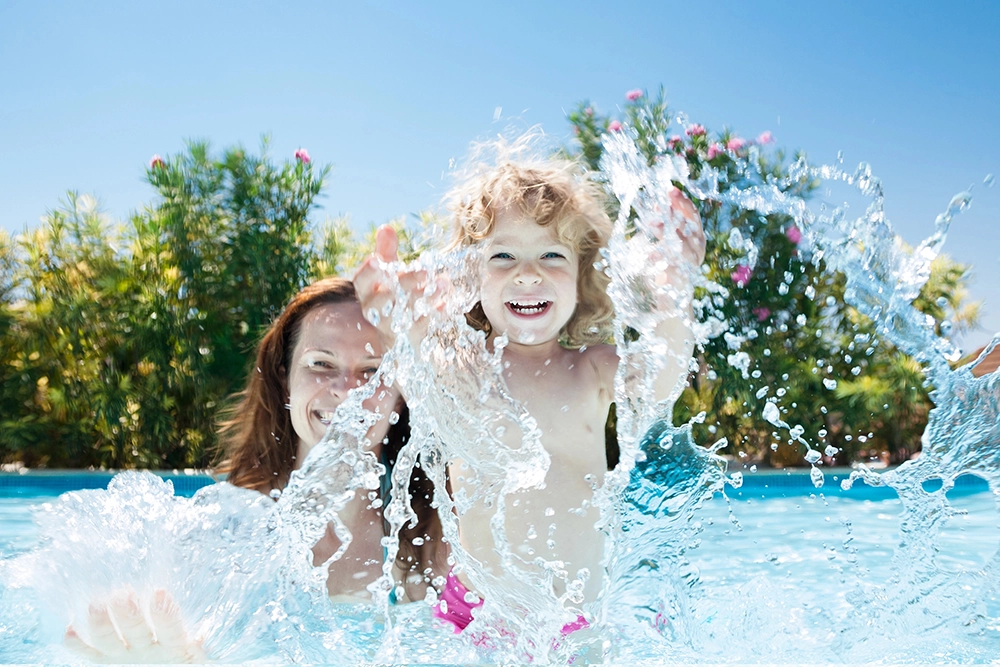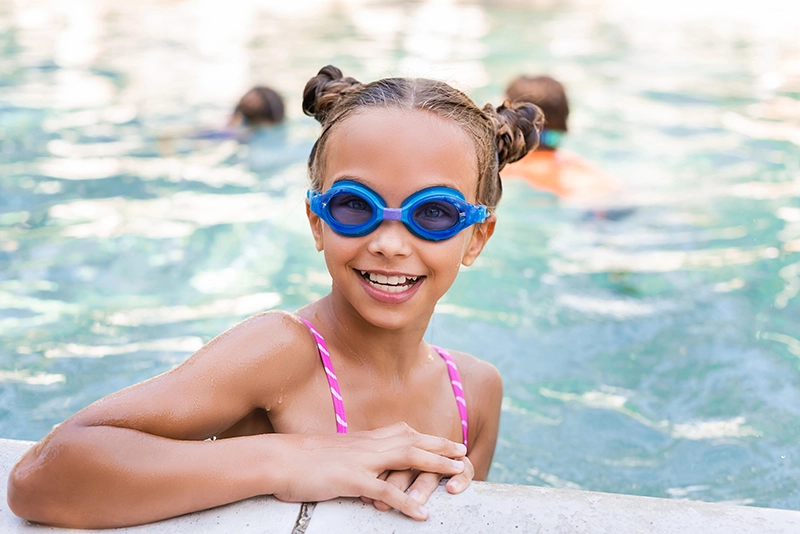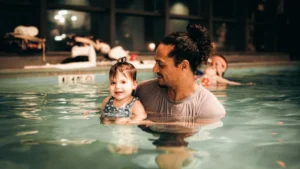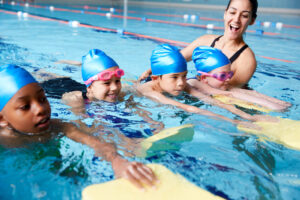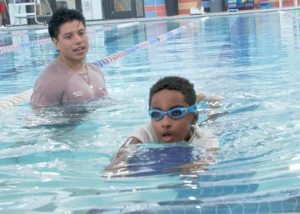Create Positive Experiences When You Practice Our Water Safety Tips for Travelers
Summer is when many families plan a vacation that takes them out of their comfort zone: the beach, a cruise, a resort, or even a lakeside retreat. This is the time to make unforgettable memories together— all while staying safe!
Every year, approximately 449,000 people die from drowning worldwide, with a significant number involving travelers who underestimate unfamiliar conditions.
The most effective travelers’ water safety tip? Make sure every family member knows how to swim properly before takeoff. Families with strong swim skills have a much different vacation experience than those who lack water confidence: less stress, more enjoyment, and photos with the whole family playing in the water.
Why Traveling Changes Everything About Water Safety
At home, you know your local pool’s depth, you know where the lifeguards sit, and you’re comfortable in your home turf’s setting. Travel removes all those familiar protections.
Foreign beaches may have dangerous currents that locals consider normal. Cruise ships operate under different safety regulations, and hotel pools may lack the lifeguards you expect. Language barriers may also complicate emergency situations, and local customs may be unfamiliar.
The families who can handle these challenges best have one thing in common: They all know how to swim before leaving home.
Research Your Destination
Strong swimming abilities provide the foundation, but research adds another layer of protection. Different destinations present specific challenges that even confident swimmers need to be aware of.
For Beach Destinations:
- Look up local ocean conditions, including rip current frequency and jellyfish seasons
- Check if beaches have lifeguards and what their schedules are
- Research local marine life that could pose risks
- Understand flag warning systems (they vary by country)
- Find out about water quality and pollution alerts
For Pool Destinations:
- Read recent hotel reviews mentioning pool safety and cleanliness
- Check if pools have depth markers and safety equipment
- Look for mentions of pool fencing and supervision policies
- Verify if lifeguards are on duty or if it’s unsupervised swimming
For Cruise Ships:
- Research the ship’s pool policies and age restrictions
- Understand deck layouts and emergency procedures
- Check if swim lessons or water safety programs are available onboard
Hotel Pool Safety: Even Strong Swimmers Need Supervision
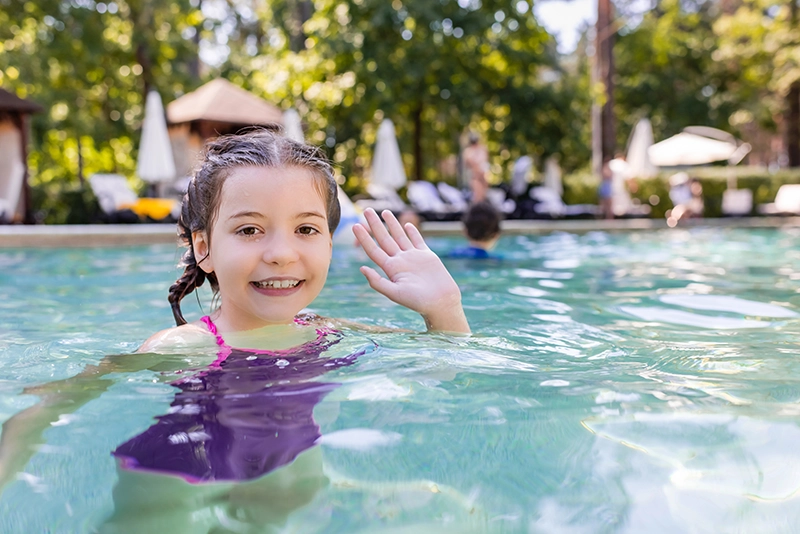
Hotel pools appear safe and familiar, but most operate without lifeguards. This places complete responsibility on parents, even when children are proficient swimmers.
The advantage of having strong swimmers becomes clear here—supervision shifts from preventing drowning to managing activities and ensuring good judgment. Parents can focus on behavior rather than constantly worrying about their children’s safety.
Before Your Kids Enter the Water:
- Personally inspect the pool area for safety hazards
- Check that depth markers are visible and accurate
- Look for emergency equipment like life rings or reaching tools
- Verify that pool gates and fencing are secure
- Note the location of emergency contact information
Essential Hotel Pool Rules:
- Never leave children unattended, even for seconds
- Maintain constant visual contact with all swimmers
- Establish clear pool boundaries before anyone enters
- Review emergency procedures with older children
- Keep emergency numbers easily accessible
Pro Tip: Strong swimmers can effectively implement the buddy system. They assist younger siblings and alert adults to problems, creating additional safety networks.
Beach and Ocean Water Safety: Where Swimming Skills Really Matter
Ocean conditions challenge even experienced swimmers. Waves, currents, and changing environments test abilities in ways pool swimming cannot. Quality swimming instruction makes the critical difference here.
Children who completed proper swim programs understand breath control, handle unexpected submersion, and know how to conserve energy while swimming. These abilities become essential in ocean environments where conditions change rapidly.
Before Hitting the Beach:
- Check with local lifeguards about current conditions
- Ask about specific hazards like rip currents, marine life, or underwater obstacles
- Understand the local flag warning system
- Identify the nearest medical facilities
- Establish clear swimming boundaries with your children
Cruise Ship Swimming: Unique Considerations
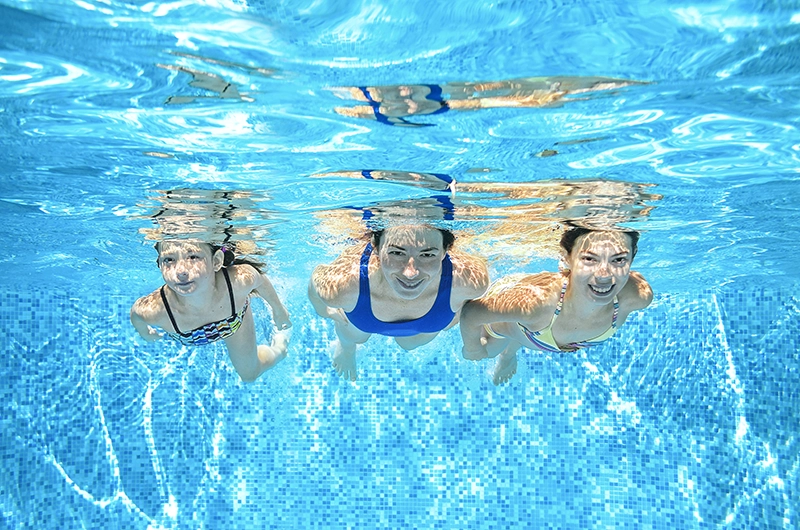
Cruise ships create interesting challenges because pools move with the vessel. Water sloshes unexpectedly, crowds create chaos, and excitement can override good judgment. Children with strong swimming skills manage these conditions significantly better than those who are non-swimmers.
Cruise Pool Safety Basics:
- Understand that pools may close during rough seas
- Be aware that water can slosh unexpectedly due to ship movement
- Know that pools are typically much more crowded than hotel pools
- Recognize that lifeguard coverage varies by cruise line
- Learn the ship’s specific pool rules and age restrictions
- Don’t let kids crawl on the ship’s protective railings
Managing Crowds and Excitement: Cruise environments overwhelm children with excitement, sometimes leading to poor water decisions. Strong swimmers demonstrate better judgment because they feel confident rather than fearful or overconfident:
- Establish clear check-in times and locations
- Create a family meeting spot in case anyone gets separated
- Review safety rules multiple times, especially on embarkation day
- Consider planning pool time during less crowded hours
- Bring dedicated supervision for larger family groups
Building Water Confidence Before You Travel
Solid swimming skills form the foundation of effective travelers’ water safety tips. All other precautions—supervision, equipment, and emergency planning—work better when children swim confidently and independently.
Professional swimming instruction before travel makes a significant difference. At WeAquatics, our Learn-to-Swim programs help children and adults of all ages develop travel-ready skills, including breath control, endurance, and confidence in various water conditions.
For younger children, Infant Swimming Resource™ (ISR) classes provide essential survival water skills that could prevent tragedy if supervision fails.
Swimming safety is not just for children. What good is it if only the children understand water safety, but the adult family members lack the confidence to jump into the water? We advocate for the whole family to have basic water skills—mom, dad, aunts, uncles, and grandparents, too. If the main events at your travel destination revolve around water, every traveler should have confidence in the water.
Travel-Ready Swimming Skills Include:
- Swimming at least 25 yards independently
- Treading water for 30 seconds minimum
- Breath control and underwater swimming
- Understanding and following water safety rules consistently
- Staying calm in unexpected water situations
We Are Building Confident Swimmers in DMV
Travel plans involving significant water activities benefit from professional swimming instruction beforehand. Strong swimming skills improve both safety and enjoyment for the entire family during vacation.
Confident swimmers can:
- Participate more fully in vacation activities
- Require less intensive supervision
- Handle unexpected situations better
- Enjoy water experiences without fear
- Become positive examples
Ready to make your whole vacation crew water safe for a positive, memorable experience? Connect with WeAquatics to jumpstart your family’s swim confidence with Learn-to-Swim classes for ages 4 through adult, as well as ISR (ages 6 months to 4 years), focusing on little ones’ water survival skills.

